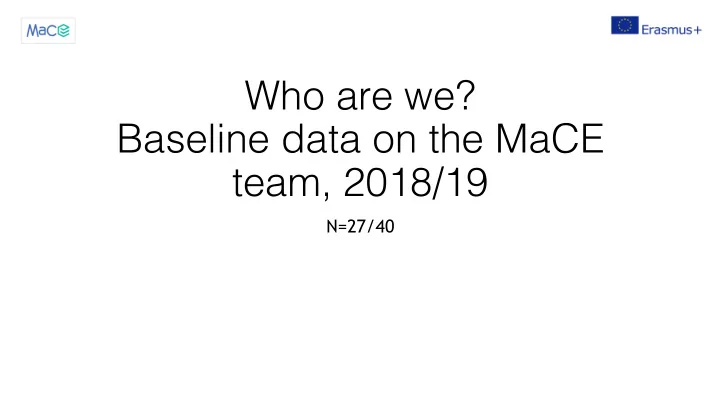

Who are we? Baseline data on the MaCE team, 2018/19 N=27/40
About us
Country of Origin
Respondents Roles
Higher Education Experience
Age started secondary education 9 7 5 2 0 Eleven Twelve Thirteen Fourteen Fifteen Sixteen Seventeen Eighteen
Age finished / left secondary education 8 6 4 2 0 Fifteen Sixteen Seventeen Eighteen Nineteen Twenty Twenty-one Twenty-two
Quality of Secondary Education
Factors that affect the quality of secondary education 5 4 3 1 0 Standards Resources Feedback Disciplined Teacher qualifications Teacher absence Motivation Positive Negative
Rating for Curriculum
Factors that affect the quality of curriculum 3 2 2 1 0 Flexibility Choice Inspiring Relevance Pedagogy Challenge Expectations Holistic Positive Negative
Quality of Teaching
Factors that affect the quality of teaching 6 5 3 2 0 Challenge Support Relationships Value students Enthusiasm Discipline Bully / intimiate Knowledge Pedagogy Differentiation Tired Positive Negative
Quality of Relationships with Teachers
Factors that affect relationships with teachers 4 3 2 1 0 Valued students Nurture Disciplinary Nurtured Teachers like me Did not know me Positive Negative
Factors that Support Learning in Secondary Education
Other Factors • Individual perseverance • Individual determination • Labelling students within school • Wider family / peer support • The socio-cultural context of education
Factors that Obstruct Learning
Respondents with Breaks in Schooling
Reasons for Breaks in Secondary Education • Curriculum irrelevant • Choices limited • School moves • Country moves • Other employment • Gaps of many months • One gap – many gaps throughout schooling.
Impact of Breaks in Secondary Education • Lack of qualifications • Low self-confidence • Low motivation • Low expectations / aspirations • More likely to engage in risky behaviours • Insecure / imposter syndrome • Social exclusion.
How Equitable was Secondary Education Overall?
Higher Education Experience
Years of Higher Education 7 5 4 2 0 1 2 3 4 5 6 7 8 9 10+
Mode of Study
Quality of Higher Education
Overall quality of higher education 2 2 1 1 0 Teacher qualifications Support Safe Relevance Lonely Resources Communication Positive Negative
Quality of Higher Education Curriculum
Factors that affect the curriculum quality in HE 4 3 2 1 0 Contemporary Pedagogy Holistic Challenge Interest Relevance Interaction Variety Positive Negative
Quality of Pedagogy in Higher Education
Factors that affect teaching in HE 5 4 3 1 0 Pedagogy skill Interst / engage Liked me Digital Flexibility Feedback Support Positive Negative
Quality of Relationships with HE Staff
Factors that affect relationships with staff in HE 5 4 3 1 0 Involvement and interest Support Respect Approachability Digital Class size Academic / personal balance Time / access Positive Negative
Factors that affect learning in HE 12 9 6 3 0 Motivation Safety Resources Theory / practice / work Environment Other demands Learning needs / disabilities Positive Negative
Respondents with Breaks in HE Study
Reasons and Impact for Breaks in HE Study • Employment • Change of direction • Other commitments • Travel • Family • All led to positive impact.
Equity of HE Experience Overall
Factors that affect equity in HE 2 2 1 1 0 Cost Ownership Responsibility Diverse student needs Resourcing Support from home
Self-assessment
Ability to read and understand background literature
Understand the concepts used in the project
Work with co-researchers
Meet and talk to young people
Ask the right questions when I am with young people
Research ethically
Code data
Develop findings from the data
Write up a paper
Co-construct solutions
Complete the assignment
I can solve most problems if I invest the necessary effort
Reasons for starting MaCE 8 6 4 2 0 Social justice Research Collaboration Impact Work with YP Knowledge gains Relevance Internationalism Challenge Interest in ESL Personal relevance
Fears about the project 6 5 3 2 0 Scale Research Pressure Health Academic literacy Questionnaires English lanaguage Making impact Supporting studentsAble to understand
Hopes for the project 8 6 4 2 0 Co-creation Fun Improve work with YP Give YP voice Confidence Supports my future
Recommend
More recommend